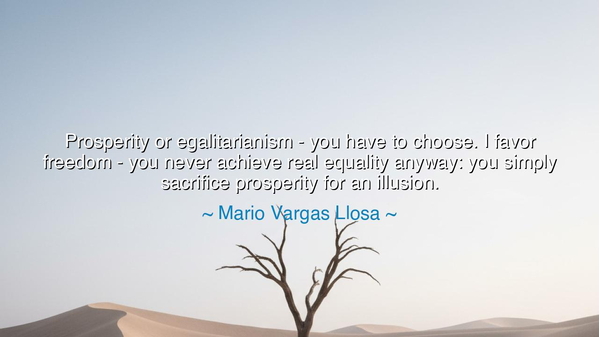
Prosperity or egalitarianism - you have to choose. I favor
Prosperity or egalitarianism - you have to choose. I favor freedom - you never achieve real equality anyway: you simply sacrifice prosperity for an illusion.






In the clear yet thunderous words of Mario Vargas Llosa, the Peruvian sage of letters and liberty, we hear the eternal tension that has haunted all human societies: “Prosperity or egalitarianism – you have to choose. I favor freedom – you never achieve real equality anyway: you simply sacrifice prosperity for an illusion.” These words are not born from cynicism, but from the long observation of history’s failures and triumphs. They speak to the heart of civilization’s greatest dilemma—how to balance justice and freedom, fairness and ambition, compassion and creation. Llosa, who lived through the storms of ideology and tyranny in Latin America, knew that the desire for perfect equality can, when unrestrained, destroy the very freedom that gives birth to prosperity.
The origin of this quote lies in Llosa’s lifelong battle against totalitarianism and the false promises of utopian politics. Having seen the rise of dictatorships clothed in the rhetoric of equality—those who claimed to build paradise through control—he recognized that whenever a state seeks to impose egalitarianism by force, it must first destroy liberty. In his native Peru, and in neighboring lands consumed by socialist revolutions, he saw how societies that began by exalting equality ended in ruin—equal, yes, but equal in poverty and fear. Thus, his words are a cry of warning to all generations: freedom, though imperfect, is the mother of progress; equality, when enforced, becomes a mask for oppression.
In the realm of ideas, Llosa stands beside the philosophers of liberty—John Stuart Mill, Alexis de Tocqueville, and Friedrich Hayek—men who understood that while freedom produces inequalities of outcome, it also unleashes the boundless potential of human creativity. To favor freedom, as Llosa does, is not to despise justice, but to recognize that prosperity—the flourishing of art, science, enterprise, and joy—cannot grow in the soil of compulsion. A society that tries to make all men equal in wealth will soon make them equal in misery, for to level all outcomes, one must first shackle all choices.
Consider the fate of the Soviet Union, that vast experiment in enforced equality. It began with dreams of justice, with promises to lift the poor and humble. But soon, those dreams hardened into tyranny. In pursuit of equality, the state silenced dissent, crushed individuality, and extinguished enterprise. The farmer could not reap what he sowed, the thinker could not speak what he believed, and the artist could not paint what he saw. The result was not equality of dignity, but equality of despair. Llosa’s words remind us that the illusion of equality—that all outcomes can be made the same—costs far more than it gives. Freedom, though it allows disparity, gives life to progress; coercion, though it claims fairness, breeds decay.
Yet, Llosa’s teaching is not a hymn to greed, nor a denial of compassion. He does not reject the moral duty to aid the poor or protect the weak. Rather, he warns that such compassion must never be wielded as a weapon against freedom itself. True equality, he implies, lies not in equal possessions, but in equal opportunity—in giving every soul the right to rise, to strive, to dream, and to fail without fear. Prosperity is not the privilege of the few, but the fruit of liberty cultivated by all. For when each person is free to pursue their calling, the wealth of nations grows, and even the least among them are lifted higher than under the most rigid tyranny of equality.
The ancients understood this truth well. In Athens, where freedom and debate flourished, art and philosophy soared to immortal heights. In Sparta, where equality was enforced by discipline and control, glory burned briefly but left no lasting light. History, Llosa reminds us, is the great teacher of contrasts: wherever man has chosen liberty over constraint, civilization has blossomed; wherever he has sacrificed freedom for the illusion of equality, darkness has followed.
So let this teaching be passed down to all who seek wisdom in the affairs of nations and the governance of their own hearts: freedom is the wellspring of both prosperity and dignity. Beware of those who promise equality at the cost of liberty, for they trade your soul for comfort and your future for illusion. True justice lies not in pulling others down, but in lifting all through opportunity and law. Give each man and woman the right to labor, to think, to build, and to create—and in that liberty, humanity finds its highest equality.
And thus, through the timeless wisdom of Mario Vargas Llosa, we are reminded that compassion must be guided by truth, and equality must be rooted in freedom. The path to prosperity is not paved with decrees of sameness, but with the courage to let every spirit rise. For in the end, the only equality worth defending is the equality of freedom itself—the freedom to dream, to strive, and to live fully in the radiant light of one’s own potential.






AAdministratorAdministrator
Welcome, honored guests. Please leave a comment, we will respond soon